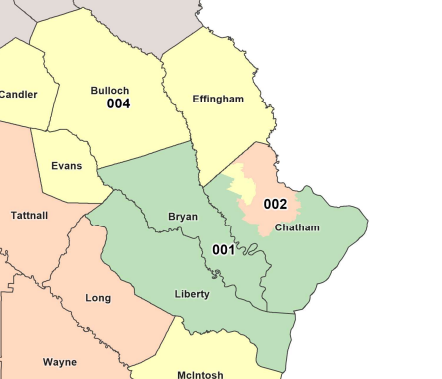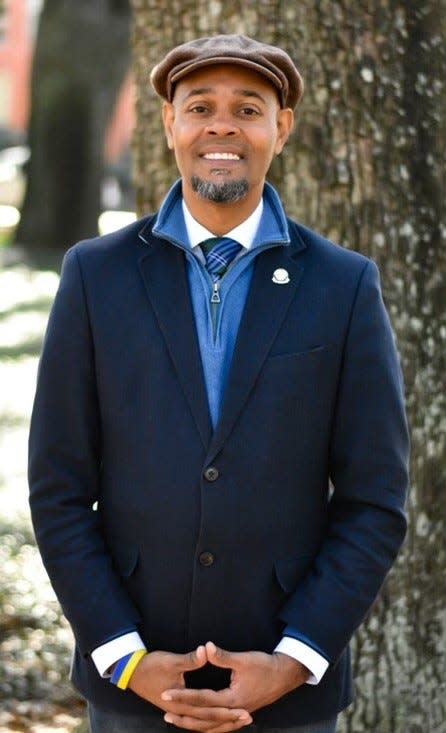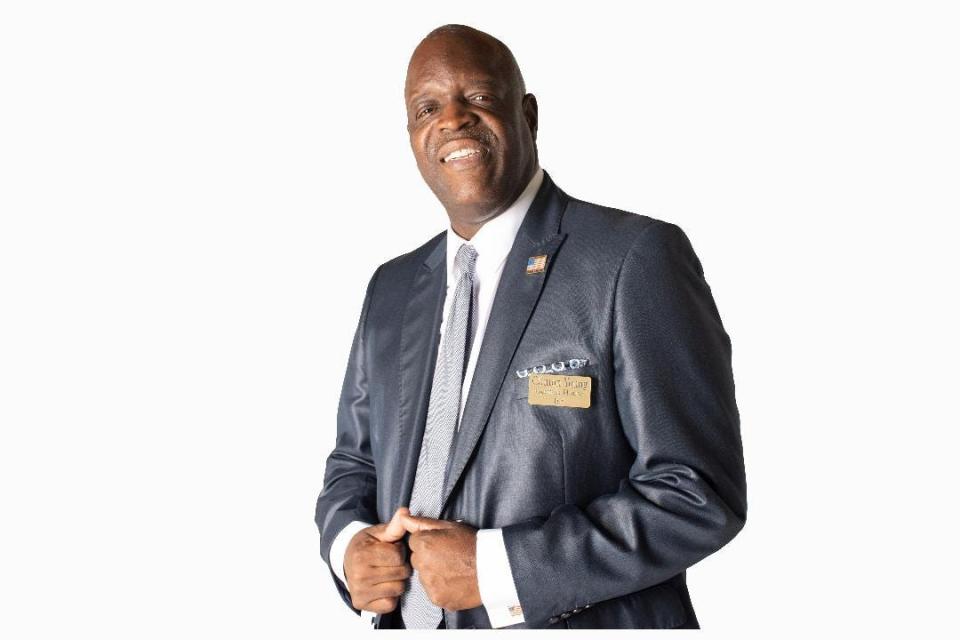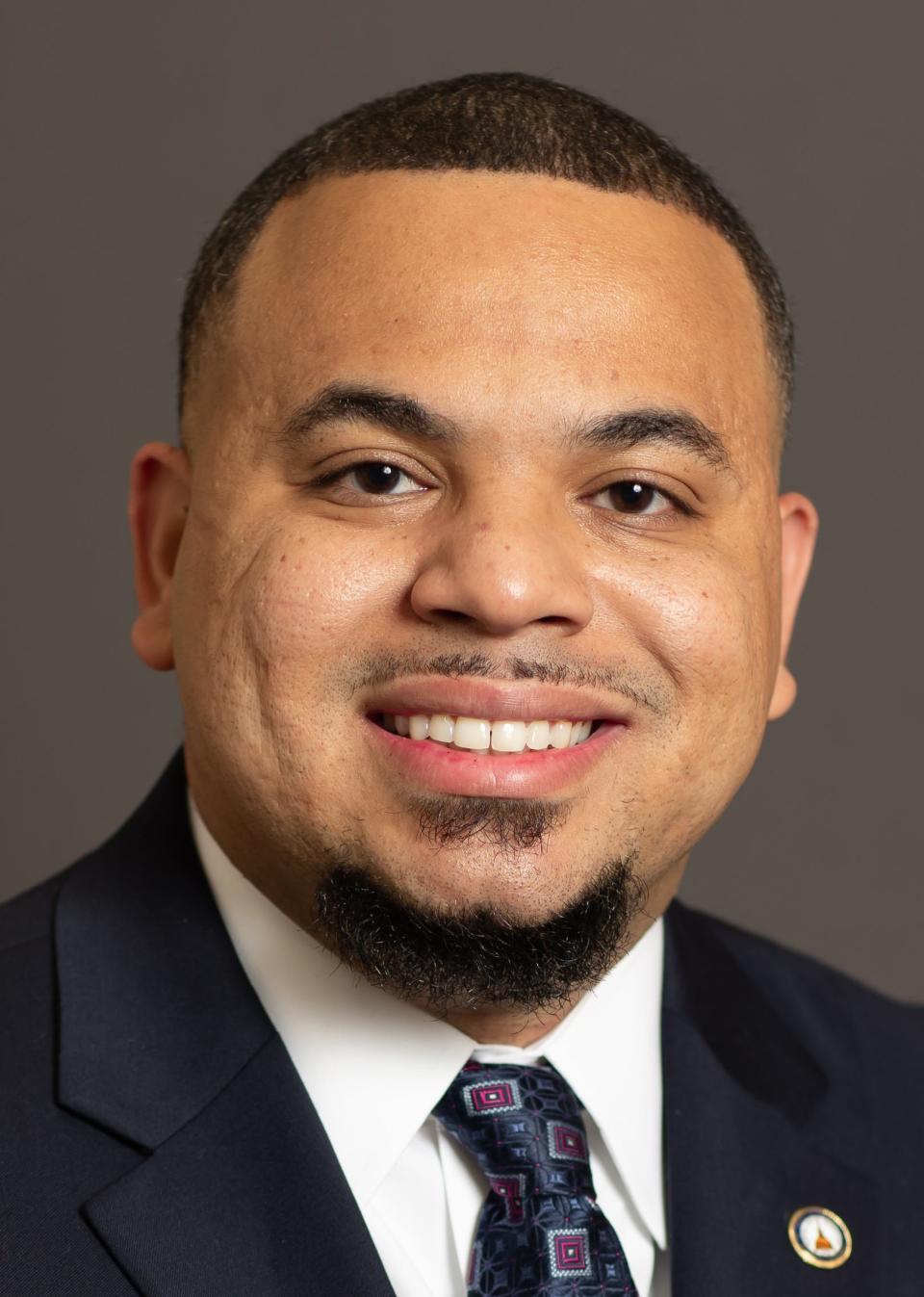Georgia Senate challengers face uphill battle vs. incumbents. Are they campaigning enough?
- Oops!Something went wrong.Please try again later.
Chatham County residents will vote for two state senators in the November election. Newcomers, James “Jay” Jones and Clinton Young, are both looking to oust experienced legislators in districts where the electorate's demographics favor the incumbents.
Jones, a Democrat, faces a significant hurdle in trying to unseat Republican Sen. Ben Watson, who’s held his District 1 post since 2015.
Young, who ran unsuccessfully for a Georgia House seat as a Democrat a year ago, registered as Republican for this race and is challenging Rep. Derek Mallow for Senate District 2. The post they’re vying for had long been home to Democratic Sen. Lester Jackson, who ran for Georgia Labor commissioner earlier this year.
Watch: Georgia Senate District 1 forum
Farewell: After 24 years, Lester Jackson completes his final session as a state lawmaker
As decided underdogs, Jones and Young would be expected to run exhaustive campaigns. But the two have taken a more subtle approach.
Compared to their opponents, they’ve collected little to nothing in campaign funds. Both candidates' most recent filings show zero dollars in contributions or expenditures (though they're also late in submitting recent quarterly reports). Jones, a former Chatham County commissioner, opted not to stake any campaign signs, distribute mailers or set up a dedicated campaign website, a counterintuitive move that Jones said is part of his overall strategy.
Early voting gets underway in the 2022 Georgia midterm election. What you need to know
Related: As Election Day approaches in Georgia, campaign signs are everywhere. But do they work?
Jones and Young are banking on more grassroots outreach efforts, such as canvassing - going door to door in district neighborhoods and calling constituents on the phone. They also hope to tap into voter dissatisfaction with the current Senate.
'It’s a winnable race'
Jones isn’t a stranger to representing constituents at the local level, but the Senate run is his first statewide bid. Between 2017 and 2020, the former county commissioner oversaw District 6, the southernmost portion of the county comprised largely of the unincorporated area.
The Georgia Senate’s District 1 covers a much wider swath of the county, stretching from the eastside island communities in a U-shape to the southwest corner of Chatham. To the south, the district also encompasses the entirety of Bryan and Liberty counties.

While Bryan County leans Republican, Chatham and Liberty tend to vote Democratic. Jones said he’s partially counting on that political breakdown at the ballot box this year.
However, the district overall has been red since at least 2012. When Sen. Watson faced a Democratic challenger in the 2018 midterm election and the 2020 primary, he won about 60% of the vote in both.

“The problem is getting turnout,” said Jones, “I think part of that answer to turnout is who’s at the top of the ticket. We’re cheering on (Sen. Raphael) Warnock at the U.S. Senate and Stacey Abrams as governor. With those two individuals at the top of the ticket, you’re going to increase turnout.”
Voter turnout during midterm elections are generally lower than in general elections. However, with the U.S. Senate and governorship on the ballot, experts are expecting numbers to be higher than normal this year.
But even if turnout were to reach 2020 presidential election numbers, which was about 36% in District 1, it would fall far below what Jones said he needs to win: 70%.
Election 2022: High turnout likely in November, as the 2020 election still hasn't ended for Georgia voters
Meanwhile, the candidate said increasing his presence by way of signs and mailers isn’t as effective as personal forms of outreach. According to Jones, he and his campaign team have reached about 9,000 individuals either by phone or in person.
They’ve also held “small intimate town halls” and hope to have at least five more scheduled before election day.
“You can put signs out, you can do all that stuff in the world, but (on the local level) the greatest effort you can ever do, is making sure you build relationships in the community,” Jones said.
While Jones may be able to rely on his past tenure as Chatham County commissioner and other local boards and organizations, he said he’s had to make an effort to connect with constituents in Bryan and Liberty counties.
“Liberty County has not been seen or heard by Ben Watson,” said Jones, taking a dig at his opponent. “They don't vote in high numbers because when you talk to them, they feel that they're not being represented.”
Watson countered those claims and said he's been working with Liberty County officials over the past few months.
"I represent Liberty, Bryan and part of Chatham, but I also represent all the citizens of the state of Georgia," said Watson, "Other than my opponent, I've not heard anyone complain about representation."
Jones hopes to mobilize the Democratic base in Liberty. He holds liberal views on abortion, a key issue on the ballot this election. The candidate also voiced support to reexamine how public schools are being funded. The politically fraught Quality Basic Education (QBE) funding formula hasn’t been revisited since 1985.
Georgia: Senate candidates Jones and Watson tackle weighty issues at forum ahead of election
Jones also urged investing in more hospitals, quality health care and expanding Medicaid. And, with more growth coming to the region, Jones stressed the importance of creating better infrastructure and investing in workforce development for the existing community.
“I appreciate creating jobs, but my thing is you're creating jobs for a group of people who don't live here,” said Jones.
However, without a campaign website or flyer distilling a wide range of concerns, it may be hard for voters to grasp the candidate’s key issues.
Yet, Jones believes this is "a winnable race".
“I'll encourage those individuals to show up to the polls," Jones said, "and vote straight down the ballot.”
'I represent the common man'
Young is staking his claim as a candidate with Republican values, even though he previously ran and lost as a Democrat last fall in the special election for House District 165. While the party switch may have gotten him through the primary, Young faces a steep climb for the midterm election in a longtime blue district.
Young is attempting to flip the district against his challenger, Mallow, a Democrat who’s served two years as the District 163 House representative. Mallow's House district overlaps slightly with the Senate district.

A look at the results from the primary election further outlines Young’s challenge: Mallow received 10,716 votes while Young received 3,604.
"We need a state senator with legislative experience and someone that understands what we need on the coast," said Mallow.
The representative said he has plans to push for legislation that will help reduce poverty and crime for marginalized groups in Georgia. His platform's key issues encompass pushing for more affordable housing, decriminalizing traffic misdemeanors and fully expanding Medicaid.

Young, however, said he doesn’t view his inexperience as a disadvantage. Instead, he believes voters will view his life experiences as reasons he should be their representative. The U.S. Army veteran and businessman grew up in the Frazier homes public housing complex, where he saw poverty and violence up close.
“My rise from poverty, my experience as a veteran, my experience as a father and husband and my experience with illnesses – I think I represent the common man,” he said.
Young ran three failed bids for Savannah City Council before his 2021 Georgia House run, so he has some name recognition with voters. As for why he's running this race as a Republican, he cites “a lot of deficiencies” that he's witnessed during Jackson's time leading the district.
“I think people will see that they’ve been hoodwinked. If you ask the question, ‘Are you better off today than you were two years ago?’ this person is going to say ‘no’,” said Young, “People are feeling the real time issues in the second district … It’s abortion, it’s crime and it’s inflation.”
Young said he’s always been a conservative at heart. He’s fiscally conservative, pro-small business, pro-life and pro-Second Amendment.
Outlined on his campaign flyer is a plan to charge five cents per paper lottery ticket to increase funding for public safety, education and transportation, a proposal he dubs the “SET Act”. In addition to increasing funding in those areas, the act also calls for a 10 p.m. curfew for children under the age of 18.
Another key issue for the candidate is continued funding for House Bill 114, which extended Medicaid coverage for mothers post-partum from two months to six months. The bill was passed by the Georgia General Assembly and signed into law in 2020. Young highlighted this issue due to his late wife’s experience with pre-eclampsia, which resulted in post-partum complications.
On the campaign front, Young said he’s aiming to reach 5,000 households through door-to-door knocking. He’s running radio campaigns and said he has the support of local churches. The District 2 contender said he’s basically holding down his own campaign.
Online records show that Young hasn’t received a dollar in campaign contributions, though his last filing date was in April. The Savannah Area Republican Women agreed to donate $1,250 during their October meeting. In contrast, Mallow has received about $98,000 from individuals and groups.
Young is counting on voters’ sentiment that the current period is an inflection point.
Addressing constituents, Young asked, “Who do you think will serve you better?”
Nancy Guan is the general assignment reporter covering Chatham County municipalities. Reach her at nguan@gannett.com or on Twitter @nancyguann.
This article originally appeared on Savannah Morning News: Newcomers to GA Senate races face uphill battle. How will they fare?

